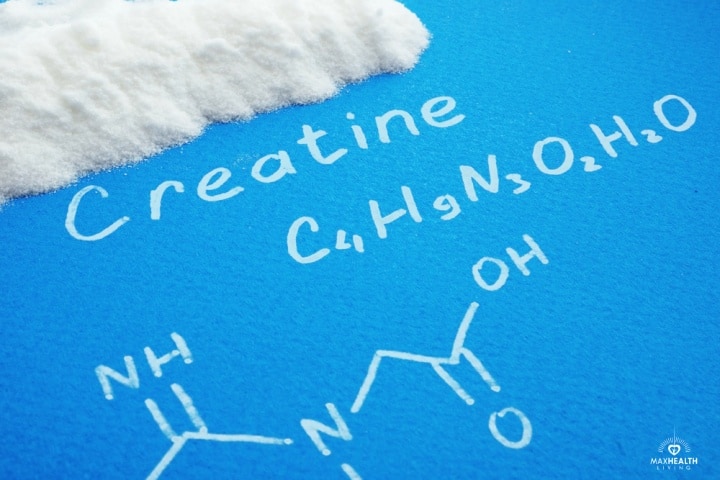Creatine for Muscle Strength – Does it Help? (Guide)
Max Health Living is a reader-supported site. Purchases made through links may earn a commission. Learn more.
Dietary supplementation has been long sought after by individuals looking to enhance their muscle strength and athletic performance for decades. One such supplement that has gained popular attention has been creatine.
There are many aspects you need to take into consideration when using creatine as a supplement source in your daily routine.
In this article, we will explore the effects of creatine on muscle strength and delve into the science behind this.
Understanding Creatine
Creatine is an ergogenic supplement that has been used by athletes to help increase muscle mass and muscle strength. Creatine plays a pivotal role in providing quick bursts of energy during high-intensity, short-duration exercise workouts.
This naturally occurring compound can also be found in foods such as red meats and is synthesized within the human body, playing a crucial role in the replenishment of adenosine triphosphate (ATP) – the primary energy currency of our cells.

Biochemistry of Creatine for Muscle Strength
Creatine is a naturally occurring amino acid that the human body produces and was first discovered in 1832 by a French scientist called Michel Eugene Chevreul (Balsom, Söderlund, and Ekblom 1994).
Creatine is typically found in animal products such as red meat and fish. Ingestion of exogenous synthesis of creatine occurs in the kidneys and generally starts with amino acids such as glycine and arginine (Siedlecki et al., 2001).
The Science Behind Creatine for Muscle
Numerous scientific studies have explored the effects of creatine supplementation on muscle strength. Here are some key findings:
Increased muscle creatine content
Creatine supplementation significantly elevates the muscle’s creatine content. This increased creatine pool can contribute to improved exercise performance, particularly during activities that require short bursts of intense effort, such as weightlifting and sprinting (Buford et al., 2007).
The way creatine is utilized within muscle cells is by increasing the number of myosin fibers within the muscle cells. Myosin fibers are responsible for muscle contraction, so more myosin fibers mean more muscle strength.
Enhanced muscle endurance
Creatine can help delay muscle fatigue, allowing your muscles to push through more repetitions throughout your workouts and maintain higher levels of intensity for longer periods of time.
This can lead to greater muscle strength and hypertrophic gains (Gonzalez et al., 2022). Nevertheless, creatine has been shown to reduce muscle cell damage and inflammation, potentially speeding up the recovery process after intense workouts (Rawson and Volek, 2003).
Nevertheless, a key point to note is that creatine increases muscle glycogen stores. Glycogen is the muscle’s main energy source, so more glycogen means more energy for the muscles.
How to take creatine for muscle strength
To experience the benefits of creatine for muscle strength, it’s important to utilize creatine properly, and here is how you can use it to the best of your ability:
Dosage:
A common dosage for creatine supplementation is 3-5 grams per day. Some research suggests that individuals who take up to 20g of creatine for muscle strength per day may find that they typically see results of up to 3kg of body mass (Deminice et al., 2015).
However, individuals who are carrying out a creatine “loading phase” (e.g., 20 g/day) should consider dosing the creatine into smaller doses throughout the day, as some research has shown that dosages of greater than 10 grams may potentially lead to gastrointestinal distress (Ostojic and Ahmetovic, 2008).
Creatine timing around exercise
The mechanism of creatine timing in relation to exercising is important to note. Blood flow is increased within one second of the onset of muscular contraction, and exercising can increase the blood flow of skeletal muscles by 100-fold in comparison to rest (Joyner and Wilkins, 2007).
Blood flow increase during and after exercise can be influenced by factors such as duration, type, intensity, and volume of exercise.
Therefore, there is no scientific evidence to support whether taking creatine prior to or after exercise can benefit muscle strength.
Monitoring water retention
Creatine is an active osmotic molecule that increases free creatine (Cr) and phosphocreatine (PCr) muscle concentration after Cr supplementation increasing intracellular water retention.
Now, a lot of people might have questions regarding this, and may be wondering well if I am taking creatine how can I monitor my water weight?
Well, there are a few ways in which you can monitor your total body water weight, the gold standard protocol to assess total body water weight is through bioelectrical impedance (BIA). This will give you a practical, applicable, and less expensive method of monitoring your total body weight.
Potential side effects of taking creatine for muscle strength
There are reported side effects when individuals consume high amounts of creatine for muscle strength. Some anecdotal reports have suggested that muscle cramping, spasms, strains, gastrointestinal distress, kidney dysfunction and weight gain are among the most common side effects when taking creatine.
However, there is no clear evidence to suggest that in healthy subjects, kidney, and liver function are affected (Wallimann, Riek, and Möddel, 2017; Antonio et al., 2021).
Final Thoughts
Creatine has long been a well-researched supplement that can be a valuable addition to your fitness program. When creatine is used in combination with resistance training, it has the potential to enhance muscle strength, endurance, and recovery, helping you achieve your fitness goals more effectively.
In addition, it is fair to say that taking creatine for muscle building 20g/day is beneficial for muscle strength and body mass, if this is split up into 2 equal doses of 10g twice per day, you may mitigate any gastrointestinal issues.
Moreover, the timing of creatine intake does not appear to significantly impact progress, as there is no conclusive research suggesting otherwise.
Overall, creatine is generally safe for most people; however, it is important to talk to your healthcare professional before taking any supplements, especially if you have any underlying health conditions.
Here are some additional things to consider about creatine supplementation:
- Creatine is most effective when used in conjunction with resistance training.
- Creatine can be taken with or without food, but it is best to take it at the same time each day.
- If you are new to creatine supplementation, it is best to start with a lower dose (e.g., 3 grams per day) and gradually increase the dose to 5 grams per day over a period of 1-2 weeks.
- Creatine can cause stomach upset in some people, especially when taken in high doses. If you experience stomach upset, try taking creatine with food or reducing the dose.
- Creatine can also cause weight gain, but this is usually due to water retention. The weight gain is typically temporary and goes away once you stop taking creatine.
- Overall, creatine supplementation is a safe and effective way to improve muscle strength and overall health. It is a valuable tool for anyone who wants to improve their physical performance and quality of life.
References:
- Antonio, J., Candow, D.G., Forbes, S.C., Gualano, B., Jagim, A.R., Kreider, R.B., Rawson, E.S., Smith-Ryan, A.E., VanDusseldorp, T.A., Willoughby, D.S. and Ziegenfuss, T.N., 2021. Common questions and misconceptions about creatine supplementation: what does the scientific evidence really show?. Journal of the International Society of Sports Nutrition, 18(1), p.13.
- Balsom, P.D., Söderlund, K. and Ekblom, B., 1994. Creatine in humans with special reference to creatine supplementation. Sports medicine, 18, pp.268-280.
- Buford, T. W., Kreider, R. B., Stout, J. R., Greenwood, M., Campbell, B., Spano, M., … & Antonio, J. (2007). International Society of Sports Nutrition position stand: creatine supplementation and exercise. Journal of the International Society of Sports Nutrition, 4(1), 6.
- Candow, D. G., Vogt, E., Johannsmeyer, S., Cakir, Y., Schröder, J., & Hudson, J. (2015). Strategic creatine supplementation and resistance training in healthy older adults. Applied Physiology, Nutrition, and Metabolism, 40(7), 689-694.
- Deminice, R., Rosa, F.T., Pfrimer, K., Ferrioli, E., Jordao, A.A. and Freitas, E., 2015. Creatine supplementation increases total body water in soccer players: a deuterium oxide dilution study. International journal of sports medicine, pp.149-153.
- Gonzalez, D.E., McAllister, M.J., Waldman, H.S., Ferrando, A.A., Joyce, J., Barringer, N.D., Dawes, J.J., Kieffer, A.J., Harvey, T., Kerksick, C.M. and Stout, J.R., 2022. International society of sports nutrition position stand: tactical athlete nutrition. Journal of the International Society of Sports Nutrition, 19(1), pp.267-315.
- Joyner, M.J. and Wilkins, B.W., 2007. Exercise hyperaemia: is anything obligatory but the hyperaemia?. The Journal of physiology, 583(3), pp.855-860.
- Kreider, R. B., Kalman, D. S., Antonio, J., Ziegenfuss, T. N., Wildman, R., Collins, R., … & Lopez, H. L. (2017). International Society of Sports Nutrition position stand: safety and efficacy of creatine supplementation in exercise, sport, and medicine. Journal of the International Society of Sports Nutrition, 14(1), 18.
- Ostojic, S.M. and Ahmetovic, Z., 2008. Gastrointestinal distress after creatine supplementation in athletes: are side effects dose dependent?. Research in Sports Medicine, 16(1), pp.15-22.
- Rawson, E. S., & Volek, J. S. (2003). Effects of creatine supplementation and resistance training on muscle strength and weightlifting performance. Journal of Strength and Conditioning Research, 17(4), 822-831.
- Rawson, E.S. and Volek, J.S., 2003. Effects of creatine supplementation and resistance training on muscle strength and weightlifting performance. The Journal of Strength & Conditioning Research, 17(4), pp.822-831.
- Siedlecki, W., Remjasz, K., Kosz, K., Kuchnicka, A., Kuchnicka, J., Zarankiewicz, N., Zielińska, M., Sapuła, K., Aleksandrowicz, J. and Fabiś, M., 2022. Creatine supplementation and its influence on human organism. Journal of Education, Health and Sport, 12(9), pp.20-24.
- Wallimann, T., Riek, U. and Möddel, M., 2017. Intradialytic creatine supplementation: A scientific rationale for improving the health and quality of life of dialysis patients. Medical hypotheses, 99, pp.1-14.
Important Disclaimer: The information contained on MAX HEALTH LIVING is intended for informational and educational purposes only. Any statements made on this website have not been evaluated by the FDA and any information or products discussed are not intended to diagnose, cure, treat, or prevent any disease or illness. Please consult a healthcare practitioner before making changes to your diet or taking supplements that may interfere with medications.
Who We Are

We are a team of fitness, health, and supplement experts, and content creators. Over the past 4 years, we have spent over 123,000 hours researching food supplements, meal shakes, weight loss, and healthy living. Our aim is to educate people about their effects, benefits, and how to achieve a maximum healthy lifestyle. Read more.




